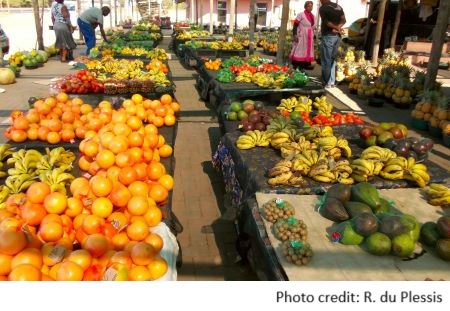"ReconAfrica's oil exploration activities have damaged homes, devastated subsistence crops, and destroyed land, illegally and without the consent of local Indigenous communities. They’ve demonstrated a complete lack of concern for the impact that their actions have on the fundamental rights of the local communities and the protected species will be driven closer to extinction." – Rob Parker, member of Saving Okavango's Unique Life (SOUL)
After years of persistent advocacy by GRAN and partners, a formal complaint against the Canadian oil and gas company Reconnaissance Energy Africa Ltd. (ReconAfrica) has now been lodged with the Canadian Ombudsperson for Responsible Enterprise (CORE), alleging human rights abuses in Namibia.
This complaint to the Ombudsperson is a critical step in protecting the ecologically sensitive Okavango Delta region and the rights of Indigenous small-scale farmers and fishers who live and work within it. Click here to learn more about this important human rights case and the GRAN partner organizations that are working to protect the Okavango Delta and its people.
Tuesday’s federal Budget contained a modest increase to Canada’s investment in humanitarian assistance. This was welcomed by Canadian civil society organizations, and was especially good to see, given the very concerning recent cuts to foreign aid by other G7 countries such as France and the UK.
Click here to read further analysis, and comments from International Development Minister Ahmed Hussen and NDP foreign affairs and international development critic Heather McPherson.
“Canada’s ongoing support for gender equality, the empowerment of women and girls, a greener economy and economic resilience in Africa is unwavering. My recent visit to Benin and the Democratic Republic of Congo brought visibility to our shared goals and was a reminder of how together, we continue to work toward a more equitable future for all.” -- Ahmed Hussen, Minister of International Development
Click here to read the Global Affairs Canada news release for details about the projects this funding will support.
The European Court of Human Rights (ECHR) ruled on Tuesday in favour of a group of more than 2000 older women from Switzerland who had argued that their government's inadequate efforts to combat climate change put them at risk of dying during heat waves. The European court's decision could have a ripple effect across Europe and beyond, setting a precedent for how some courts deal with the rising tide of climate litigation argued on the basis of human rights infringements. Click here to read more.
Tremendous politicized hype and disinformation have been hitting the airwaves and social media lately around Canada's climate policies and, in particular, carbon pricing. Climate policies have nothing to do with the economic hardships Canadians are facing, yet some Canadian politicians are ignoring the real causes of the cost of living crisis and scapegoating carbon pricing to score political points. It is so important that these "bad faith" attacks on carbon pricing be countered with correct information, and that stronger action be taken to address the cost of living concerns of Canadians. Climate Action Network has issued a statement correcting the disinformation and suggesting policies that will tackle the climate and affordability crises simultaneously. GRAN has signed on to the statement. To read it, click here. Please consider sharing it broadly with your networks.
Cause for celebration! A global coalition of Civil Society Organizations, of which GRAN was a part, has won the prestigious 2023 United Nations Human Rights Prize. It is an honorary award given out every five years to individuals and organizations in recognition of outstanding achievement in human rights. The Prize is an opportunity not only to give public recognition to the achievements of the recipients themselves, but also to send a clear message of support to human rights defenders around the world. This year is the first time since its inception in 1966 that the award has been granted to a global coalition.
The Global Coalition of Civil Society, Indigenous Peoples, Social Movements, and Local Communities for the Universal Recognition of the Right to a Clean, Healthy, and Sustainable Environment accepted the Human Rights Prize in a ceremony in New York this past week. GRAN received a congratulatory note from the Coalition saying, "We are extremely grateful that you and your organization joined the coalition and supported its work. Congratulations to each of you and to Grandmothers Advocacy Network (GRAN)!"
Click here to read the full press release on this prestigious award, and here to read the Coalition's global call for the Right to a safe, clean, healthy and sustainable environment.
We invite you to celebrate with us the power of partnerships. Congratulations, GRANs!
World TB Day is observed annually on March 24 to raise awareness about TB and efforts to end the global epidemic, marking the day in 1882 when the bacterium causing TB was discovered.
TB is an ancient disease that is still with us. It is preventable and curable, and yet, worldwide, TB remains one of the world’s deadliest infectious killers. Ending the TB epidemic in all countries by 2030 is one of the targets of UN Sustainable Development Goal #3: Good Health and Well-Being.
While TB is rare in most of Canada, that is not true in Canada’s north, where in recent years TB rates in Inuit communities have been as much as 300 times higher than those of non-Indigenous people born in Canada.
On this World TB Day, learn more about this disease and efforts to end it. Click here to learn more about TB in Canada’s north. And here to find out more about global efforts to end TB.
Good news! In a unanimous declaration, African leaders pledge to end AIDS in children by 2030. Ministers and representatives from twelve African countries have committed themselves and laid out plans to end AIDS in children by 2030. International partners have set out how they will support countries in delivering on those plans, which were issued at the first ministerial meeting of the Global Alliance to end AIDS in children. For more on this announcement, click here.
"The United Nations Committee on Economic, Social and Cultural Rights... states that the right to food is indispensable for the fulfillment of other human rights. ...Since human rights are indivisible and interdependent, a human right cannot be enjoyed fully unless other human rights are also fulfilled. Advocating policies that promote other human rights — like health, education, water and sanitation, work and social protection — can positively impact the right to food as well." -- Maximo Torero, Chief Economist of the UN Food and Agriculture Organization (FAO)
Click here to read Maximo Torero's Human Rights Day article on the right to food.
Pages


